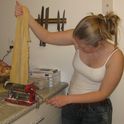Is it REALLY true that no one cooks?
Michael Pollan has a new book out about how he's learned to cook. To hear him speak, you'd think that he'd discovered a long-lost art, that no one cooks anymore and there's no cooking curriculum in schools. Is he as right as he thinks? Are there data? And what about the coed middle school "family and consumer science" classes that seem to have replaced all-girls "home ec."??
54 Comments
http://www.splendidtable...
“The basic idea is subscribing to meals that traditionally are delivered to your house. You can subscribe on a monthly basis. They are cheap, homemade, and composed of the freshest, least-expensive things from the market that day. They are for working families who still intensely value eating together -- even if it’s 9 p.m. -- and eating real food.”
http://www.splendidtable...
"The basic idea is subscribing to meals that traditionally are delivered to your house. You can subscribe on a monthly basis. They are cheap, homemade, and composed of the freshest, least-expensive things from the market that day. They are for working families who still intensely value eating together -- even if it’s 9 p.m. -- and eating real food."
I agree that cooking at home is a commitment a person/family must make. The commitment to learn something about cooking, if you don’t already know, buy the groceries, do a little planning ahead, get the whole family involved in the process. At least in the U.S., society has evolved in ways that make it difficult to incorporate this into a family’s routine:
For families with children, in the scenarios of both parents or a single parent working, there is little time to deal with all of life’s tasks. Shortcuts will often be taken with food before other areas such as homework or after-school activities. I grew up in a large family in a suburb. This is not a criticism, but we did not get driven to rigidly-scheduled soccer games or our friend’s houses for play dates. We walked or rode our bikes everywhere. We went out into the woods with the neighborhood kids and invented games, or walked to the baseball field or ballet class, or played in the school’s asphalt parking lot. So not having to drive us around to everything gave my mother, in this case, time to cook for us at home rather than ferrying us around to scheduled activities. I would say she spent at least 1/3 and even more of her time cooking, or planning for three daily meals for 7 other people, and spectacular dinners for guests at every holiday you can think of. True, she loved cooking and liked putting a lot of effort into trying new things – she took classes before it was popular in order to learn variety and different cuisines, or I think she would have gone insane. Also, we had a nearby extended family – grandparents and aunts/uncles/cousins, so there was always someone who could watch or feed some of your kids on a last-minute basis for a little while, to give you time to get something else done. And my two grandmothers were outstanding cooks, one of them being a Cordon Bleu school-trained cook at time when few women were enrolled (she’s a wonderful story for another time). Today, that lifestyle seems to be nearly impossible – because of the way school and after-school activities are structured, and the insanity around college application prep, working people just don’t have much time to do the planning, shopping and task of cooking from scratch at home – at least not every night. They really need the options of take-out and pizza.
One of my sisters-in-law is able, financially, to work only part-time. She and my brother have two daughters in high school. My S-I-L makes an enormous commitment to shopping local farms, talking to the management at her supermarket, teaching her kids about farm-to-table and how to support a local economy, teaching her kids how to follow a recipe but also “intuitive” cooking without a recipe, and running a pretty large vegetable garden, plus a side business of selling plants and shrubs. And also about the beneficial health aspects of eating fresh food. My brother is an even better cook – he just has an innate gift of understanding it all - science, flavor and creativity, and will spend an entire Sunday working on a meal. So cooking is one of his main hobbies that he’d want to spend time on anyway. Spending time preparing and eating their meals together is a priority in their family’s lifestyle. And they have neighbors with kids who enjoy the same thing, so there is support in that regard. My sister-in-law says she could not do it if the girls had more extensive commitments after school that required her to do constant driving and if my brother didn’t also enjoy it so much. Obviously she has other things to get done during the day as well.
I have always felt fortunate to grow up in a family that likes cooking and “good” food, because I think it’s hard for adults, with so many competing responsibilities, to cram in learning new things. Alas, it’s always easier to learn something when you’re younger.
On another subject – availability of fresh vegetables/ingredients: interesting interview on NPR recently about reviving supermarkets in New Orleans neighborhoods still struggling after Hurricane Katrina.
http://www.npr.org/templates...
I apologize if someone said this already, but in my experience, there are two different issues: the communal experience & value of a family or social group sitting down and eating together, and the importance of cooking that food "yourself."
I think that a lot of people don't cook and that trend is only growing as people spend more and more time at work or on long commutes and the food industry is only too happy to promote the idea that processed food is the solution. And to slap an "all natural" label on their junk to ease Mom's guilt - and jack up the price! I see my sister falling prey to this sort of thing all the time as she's got a toddler and time to cook real food is at a premium. I don't judge her for that - she lives in a working class suburb of New York with plenty of supermarkets but not a lot of farmer's markets or other affordable options for real food. And the supermarkets are all pushing the processed convenience foods, not the real stuff. So it's by no means a food desert but the whole system is pushing against cooking real food.
On the other hand, I live in the Boston area, which has quite a growing food scene and vibrant slow and local food movements. In the last ten years the farmer's market scene has exploded and I've gone from markets two days a week during the season to having a farmer's market within walking distance of my home seven days a week. Plus there are food coops and specialty stores galore that offer lots of affordable options for fresh, local, high quality food and plenty of classes and support for those who want to cook. And the number of people I run into who are taking on serious cooking projects - making their own cheese or pasta or canning, milling their own flour, etc., etc., - seems to grow every year.
Obviously this is just anecdotal. But my impression is that those who cook are cooking more than ever and more interesting stuff than ever because there's a high end food industry to support and promote that, which is growing rapidly in some places like Boston. Not to mention the internet food scene and sites like this one!
But those who don't cook, are probably cooking even less over the same time period because there's also a processed food industry that's growing and promoting that choice.
The thing to remember is it IS a choice and it's a valid one. I love to cook and I've always cooked more than my sister for that reason - also, I'm a medical writer so I understand the health benefits of eating whole foods in a way my sister just doesn't. Much as I wish my sister would the do the same for the benefit of my little nephew, she just doesn't enjoy it and she's never going to - and that's ok, she's an adult and it's her choice how she spends her time. But over time, the disparity grows. I cook more and better because there's just so many more cool ingredients available to me and I learn from my friends who also cook, and she cooks less and less because she feels more pressed for time and she's on a budget and she learns all kinds of new shortcuts from her friends.
I don't know what the answer to that is but there you have it.
(I didn' tell you about my parents, who made home cooking an adventure; my three sons who took cooking responsibility early and are excellent family cooks now... Food52-ers tend to enjoy themselves in the kitchen.)
I've taught a lot of my friends (late 20s/30s) how to cook basic foods- omelets, simple pestos, roast chicken, even tofu scrambles! My friend told me today that she makes the omelets I taught her to make every week. Her husband does most of the cooking, but now she can contribute one meal a week that and they don't have to call for takeout. Dinner doesn't have to be a huge affair. Pollan is right- some people need enough cooking skills to get by and give their families healthy meals. But I wish someone were thinking about how poor people were going to get fresh vegetables!!!
However, I'm not certain that I agree with you on cooking from scratch = expensive.
When you know how to cook from scratch, a meal with meat (not the best cut of meat, but still tender) some fresh veg and a starch for a hungry man size portion is less than a dollar a plate, including the cost of the electricity to cook it. Usually taking between 10 min to an hour of my time (actually active time, not including waiting - which can be adjusted to fit my schedule). I think most of the US has lower food prices than we do here, as I'm on an island and transportation costs are high. Bread for 3 people for a week (4 to 6 large loaves) costs me 60 cents to 1 dollar to make (depending on the price of flour and electricity that month). But I'm lazy and do sourdough, which I can fit to my own schedule and not have to be at the back and call of my food. (the above prices assume everything bought fresh from the supermarket)
But like I said elsewhere, it's easy to be on a soap box when I don't live the same life as they do. It's been years since I was last homeless, so I don't know what it's like for people now a days. I also admit I don't know the socio-economic conditions in the US. But I do maintain that eating frugally and eating well are NOT mutually exclusive.
Sadly, Pollan isn't writing for the people who need it most. His intended audience are those people with enough disposable income to buy his books. I agree with you that Pollans way to cook is not very economical in time or money. But it can be, when you know how. It just shocks me that people don't eat delicious, large meals from fresh ingredients because they think it's time consuming or expensive.
There was a mum and two kids. The older boy, probably about 6 or 7 years old, wanted to go home to eat, whereas the mum, was adamant that they were going to eat at the cafeteria because she didn't want the effort of cooking and cleaning up. The boy, "But Mum, you always make us eat out, I want to eat home food". The Mum, "We don't always eat out, we had breakfast at home yesterday." boy, "but that was frozen breakfast, I want home food! Can we have home food for dinner if we have out food for lunch?" Mum, "No. We will have lunch here, then I'll heat some thing up for dinner" - and proceeded to list the acceptable lunch choices which included corn dogs (do they still make those?), hamburgers, ice cream, or chocolate bar. Then she described the options for dinner, which included ice cream, and two types of frozen pizza, the orange box or the one with a mascot on it.
I suppose it was nice of her giving her kids a choice of what to eat. Although spending an extra 5 minutes having this discussion in front of the checkout machine while there was a bunch of us waiting to use it...not so nice. Just a note, they were local, not travelling out of town or anything. I wondered if their kitchen was broken, but if their freezer and microwave are working, well, it's tough to cook something nice, but possible.
Having two kids, albeit well behaved ones from the look of things, and cooking must be terribly hard. But isn't that why we have slow cookers? I mean, I'm making scotch broth for dinner which took all of 3 minutes this morning, and will take another 5 or 10 min to put together tonight. Will do 3 of us, 2 meals a day, for three days and only cost $3.50 for the entire pot.
This mum was about my age, and it makes me wonder if she even knows how to cook. Her children obviously know about cooking, but could she know how easy it is to make affordable nutritious meals?
Sorry, I'm horribly bias and it's easy to get on a soap box if I'm living her life. I don't know how much frozen meals cost, so they may cost way less than my soup and actually be healthier than bone broth, some whole grains, some veg and meat in a pot. I'm not a nutritionist. I just found it an interesting example to have after reading this discussion.
For the most part, I am finding the book very interesting read. His narrative style (and it is very much a narrative) is engaging, if a bit...um, how to put it... crazy-naive-foolish for those of us who already cook frequently. He has that childlike enthusiasm for cooking, because he's never done it before, and that first time magic of taking some general stuff (say flour, water and salt), mixing them together in specific ways and getting bread (his like most favourite food ever) is this whole magic thing. And, quite frankly I remember feeling the same way about the first loaf of bread I ever made - and every loaf since.
I don't have the book in front of me, so I can't give you the sources, but I found the parts where he writes about food data gathering techniques really interesting. Companies hire these researchers to find out more of demographics - who cooks, what each family member eats, how they eat, &c. Over the last 40 years or so, the definition of cook has transformed from, an example: Getting some apples, flour, lard, &c and making a pie - vs - buying some pie filling and a pie crust. Another really interesting part was when he talks about buying microwave meals for the whole family and trying to have a sit down dinner, and how it cost the same as a cooked from scratch meal would but took just about the same amount of time to make (you have to heat each dish up individually in the microwave).
I also suspect he's aiming for people my generation. I went to school in the 90s. My mother didn't cook; my father cooked but worked and seldom spent time in the kitchen. There was cooking classes available in highschool, but they were far from mandatory, in fact they were discouraged due to the expense of running them. I didn't like pre-cooked meals, so I did most of my own 'cooking' as a teen. Cooking at that time meaning, buying pre-made pasta, pre-made pasta sauce, frying some garlic and bacon to add to the sauce and maybe some carrots. If this book had been available to me as a teen, it would have totally revolutionized my life. But where I'm at now, well I find it an amusing narrative, interesting to see the feminist issues (which I never really considered before - I always saw cooking as a way of empowering people by giving themselves back control of the most important choice they can ever make in a day: what to eat - so it was neat to see why people thought of cooking as a form of enslavement), a good refresher as to the dangers of giving over your food choice to a capitalist system which focuses on maximizes profit not health, and gave me some ideas that I want to try in the kitchen.
Compared to his other books, Cooked isn't as good as In Defence of Food, but better than The Omnivore's Dilemma. I don't see it as a book that I will pour over time and time again, like a cookbook, but it is a nice reference to have on the shelf.
Frankly, he comes off as someone who just invented cooking. After hearing for the umpteenth time, something to the effect of "we teach kids about sex, why not cooking?" I started to google around and found that there are lots of public schools that teach cooking (maybe it's just microwaving?) to both boys and girls, seemingly a step forward from my era, when boys took shop and girls took home ec. It's not the first time I've heard that the family dinner is dead. I just wonder how dead it really is.
So tell us more. Should we read the book? Or how about some of the original sources?
How about the part where he discusses how the definition of the word cook has been drastically altered over the last 70 years?
I'm only just finished the Bread chapter, but I haven't yet seen the part where he says 'no one cooks'. I'm not 100% happy with everything he says in this book, but I did notice he's very careful to qualify (and cite) his more general statements.
As for no-one cooking? I think that's far too absolute a statement to be true. It's like saying no swans are white (a famous logical axiom for about a thousand years before they realized there actually are black swans) or that no one spins yarn to weave cloth to sew their clothing anymore. (I personally know several hundred real life people who do, and a few thousand more internet people who also enjoy extreme fibre arts). Michael Polan may be a lot of things, but he's not stupid enough to make general statements like that.
Michael Pollan probably wouldn't approve of my mother's shortcuts, which are more Sandra Lee than anything else. I think Pollan has an idea of fresh, from scratch cooking that is not a reality for a lot of Americans. I live an urban neighborhood, and our grocery store is seriously inadequate. Most days I can't find vegetables better than carrots and bagged lettuce. The Farmer's Market is only open one day a week--what happens if you can't make it on that day? Or can't afford a CSA? I can afford a CSA box and I drive to the next suburb over for my groceries. But many of my neighbors cannot afford more than what WIC or their small budgets afford them. That leaves them with a lot of SPAM (very popular in my neighborhood for some reason) and McDonald's. Every time I go grocery shopping, or buy an expensive ingredient, I am thankful that I can afford it. Michael Pollan, I don't think, has a realistic grasp of those struggles.
Yeah, pro chefs etc might not like them...but WTF? they have good ideas for us slobs at home trying to do better. Julia Child reached for the can Campbell beef consume for french onion soup in her show. WHY? because she knew that's people had on hand.
A shortcut and a meal..and even used a coil top oven..OMG..NOT A GAS STOVE.
It is really frustrating, though, to be bombarded by "food 1%ers" talking about how easy and ethical cooking healthful, natural, organic, local meals is. It's just utopian and unrealistic.
And I will agree with Sam that the onus seems to be on women (and the fault for falling prey to processed foods in the first place). My husband is a great cook, but he practically has unicorn status in my family--none of the men cook. Or even do the dishes after dinner. I think things are starting to change in this regard, but whether it's too little too late I can't say.
It's certainly a conversation we should be having, though, and interjected by a fair deal of real talk.
http://boingboing.net/2013/05/15/you-dont-have-a-moral-obliga.html
"I have found myself frustrated with Michael Pollan lately. In the course of promoting his new book about cooking, he's taken to spouting some opinions that I'll frankly call claptrap. He's mocked women who felt trapped by the kitchen drudgery that they got stuck with simply because they owned a vagina. He's implied that it's easy (if you're not lazy) for everyone to make every meal an ideologically sound slow-food meal. In general, he's disparaged the very idea that some people don't like to cook."
Now, we're seeing a new crop of cooks..and males cooking, due to the unfortunate competitiveness of cooking shows on TV now.
When I was young cooking was 'women's work'. Now, Despite Pollan's book, it's joint effort. But then again males get all
competitive. I fully expect in 20 years some dude is going be yelling at son, "YOU CALL THIS A CREME BURLEE?...YOU IDIOT, I COULD DO THAT IN MY SLEEP AT YOUR AGE".















